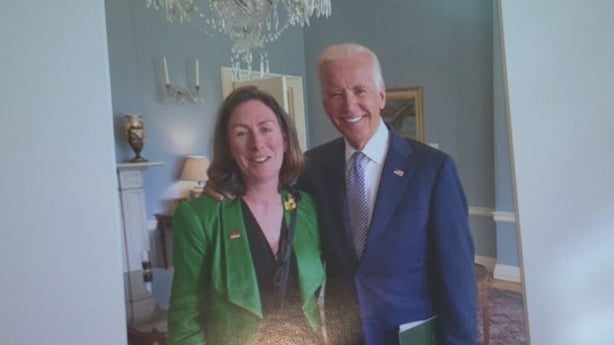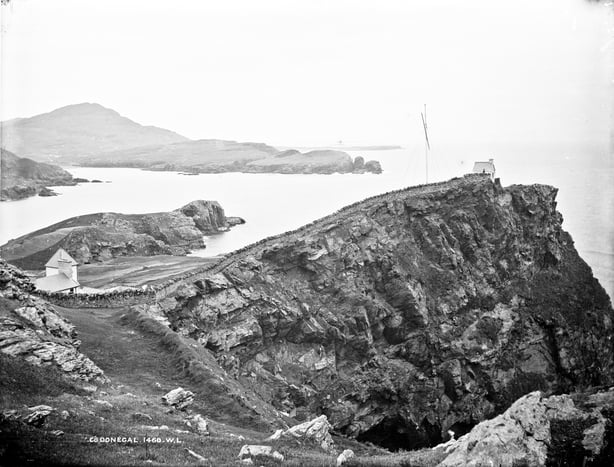
By Jackie Fox
Joe Biden was born into a proud Irish American Catholic family in the blue-collar city of Scranton Pennsylvania - a state his ancestors settled and met in.
While the president has pronounced Ireland "part of his soul", it is also part of his DNA.

A young Joe Biden (Credit: Joe Biden Campaign)
"My Grandpa Finnegan would also say… 'Remember, Joey, the best drop of blood in you is Irish,' he quipped during an address at the Windsor Bar in Dundalk on Wednesday evening.
But this is not just about the wise words of Grandpa Finnegan, the facts and historical figures are there to back it up.

Joe Biden Family Tree (Irish Family History Centre)
His strongest ties appear to be with Mayo but there are also links to Louth, Galway and Donegal.
Ten of his 16 great-great-grandparents were from the Emerald Isle.
While nine of them were born in Ireland, the tenth was the daughter of Galway immigrants. Mary Ward was born en route to the United States and would, years later, marry a Galway man.

Map of Galway showing the area Mr Biden's ancestors originated from
"To paraphrase the Duke of Wellington - just because you're born in a stable, it doesn't make you a horse. So, we claim her as being Irish," said Fiona Fitzsimons, Director of the Irish Family History Centre, who along with Helen Moss were commissioned by Joe Biden when he was vice president to delve deeper into his family's roots.
Fiona Fitzsimons said the president stands out not just because of his strong Irish links but because of the "extraordinary" fact that all his ancestors are considered "famine Irish" – meaning they arrived in the US between 1848 and 1861.

Fiona Fitzsimons with Mr Biden in 2016 when she presented him and his family with details about his Irish roots

"Normally when you get that deep rooted Irishness, you might find somebody coming in, in the early 20th century… But this is what's extraordinary … is that all of these are famine Irish," said Ms Fitzsimons.
Four of his ten great-grandparents are from Mayo - the Stantons, the Arthurs, the Basquilles and (probably the most well-known) the Blewitts.
His third great-grandfather Edward Blewitt took the five-week journey across the ocean to the United States and set up his family in Pennsylvania.
Before he took the 'coffin ship' across the Atlantic to begin a new life in America, Mr Blewitt worked for the ordnance survey office - walking about the land and helping making maps in the mid-1800s

Passenger List to the US which includes Edward Blewitt's name (Irish Family History Centre)
According to Fiona Fitzsimons, a fascinating part of the Blewitt story is that it appears Edward and his brother James were educated in a hedge school.
"Yet somehow, [the brothers] picked up enough higher maths to be able to parlay that into a surveyors job," said Fiona.
She said Edward Blewitt's drive and "entrepreneurial" side would lead to a successful life for him and his family in the United States. His grandson would go on to become a very early Irish Catholic member of the senate in Pennsylvania.
Decades later his grandson's daughter, Geraldine C Blewitt would marry Ambrose J Finnegan - another second-generation Irish person. This branch of the family tree stems from Co Louth.

Marriage of John Finnegan and Mary Kearney (Irish Family History Centre)
The Finnegans and the Kearneys, his third-great grandparents, lived right out by the sea on the Cooley Peninsula.
"The Kearneys being very industrious, they collected the seaweed off the beach. Part of their agreement with the landlord was that they could have some of the seaweed… but on the side they were selling the off product of the seaweed to the other farmers in the area," said Kayleigh Bealin, Research Manager with the Irish Family History Centre.
Not surprisingly the side hustle, when discovered, left the landlord unimpressed.
Owen Finnegan and his family left for the United States in 1849, opening a business as a shoemaker in Seneca Falls New York.
His son James would be the one to relocate to Pennsylvania along with his wife Catherine Roche and their six children - one them Ambrose J Finnegan, or Joe Biden's grandfather, who would marry Geraldine C Blewitt.
While the focus of this presidential visit to Ireland has been about Mr Biden's lineage in Co Mayo and Co Louth, there are more Irish branches to his family tree.
Joe Biden also has connections to Donegal. His great-great grandmother, Catherine Scanlon was from Co Donegal but grew up in the United States after her father, Anthony Scanlon brought his family to the US around 1848 when she was around 10 years old.

Anthony Scanlon Seamans Ticket 1845 (Credit: Irish Family History Centre)
"We believe Anthony Scanlon was originally from Co Mayo… he was a coastguard," said Ms Fitzsimons.
In the 1800s, coastguards were an emerging profession and were first recruited as revenue enforcers – hired to prevent smuggling of wine, brandy, whiskey, and tea. Later in the 1840s/1850s they were moved into saving lives.

A Coast Guard Cottage in Mayo (Credit: The National Inventory of Architectural Heritage)
"Anthony Scanlon was posted at different times around the coast, and his children appear to have been born in Donegal. We think probably Ballyshannon. We have Anthony Scanlon there in the 1830s, but unfortunately the parish registers don't start early enough for us to find baptisms," said Fiona Fitzsimons.

Donegal coast (Credit: The National Library)
From stories passed down through generations and more connections revealed over time, Ireland has always been a huge part of Joe Biden's life.
Many of the president's ancestors left an Ireland ravaged by famine - a tough reality that Joe Biden laments as he makes this historic visit.
"It feels like home. I know why my ancestors and many of your relatives left during the famine and - but, you know, when you're here, you wonder why anyone would ever want to leave."
Seoirse Mulgrew
April 13 2023
US President Joe Biden’s historic trip to Ireland has provoked a strong response from the British press.
Mr Biden’s visit will mark the 25th anniversary of the signing of the Good Friday Agreement.

Leo Varadkar rejects claims that Joe Biden is anti-British
His trip has been described by US media as “part homecoming, part diplomacy and part politics”.
CNN said Mr Biden’s trip follows in the footsteps of JFK’s visit to Ireland five months before his assassination in 1963.
Reporter Kevin Liptak said that Kennedy told aides after his visit to Ireland that it “was the best four days of my life”.
The Washington Post said the visit will afford Mr Biden the opportunity to “dive into the Irish ancestry of which he is immensely proud and speaks about often”.
The New York Times in a news piece said Joe Biden is about to receive the “warmest of welcomes”.
Taoiseach Leo Varadkar has also described it as an opportunity "to welcome a son of Ireland home, to welcome home a great Irish-American president".
Foreign policy analyst Nile Gardiner said Mr Biden has “gravely insulted Britain” in his opinion piece for the Telegraph.
Mr Gardiner, a former aide to Margaret Thatcher, said President Biden’s “insulting decision to prioritise Ireland over the UK on his visit to mark the anniversary of the Good Friday Agreement should have come as no surprise”.
He also criticised Biden for not attending the coronation of King Charles in May.
No US president has ever attended the coronation of the British monarch.
Mr Gardiner described Mr Biden’s approach towards Britain, which he labelled “traditionally America’s closest friend and ally”, as “sneering, arrogant and disrespectful”.
He added that President Biden is putting “two fingers up to the monarchy, Great Britain and its illustrious history” and that “he is no friend of the British people”.
Political cartoons were also illustrated to express dissatisfaction with Biden’s visit.
Speaking to GB News, Ms Foster said: “I just think the fact he’s coming here won’t put any pressure on the DUP, quite the reverse actually.”
However, following Biden’s speech at Ulster University, DUP leader Jeffrey Donaldson told the media the President’s words were “measured” and welcomed Mr Biden’s visit to Northern Ireland.
But Mr Donaldson said the President’s remarks do not “change the political dynamic in Northern Ireland”.
The suggestion that Mr Biden was anti-British was rejected by Amanda Sloat, senior director for Europe at the US National Security Council.
She said: “It’s simply untrue – the fact that the president is going to be engaging for the third time in three months, and then again next month and then again in June, with the prime minister of the UK shows how close our co-operation is with the UK.
“President Biden obviously is a very proud Irish-American, he is proud of those Irish roots, but he is also a strong supporter of our bilateral partnership with the UK.”

Allan Preston
13 April, 2023
THE White House has officially acknowledged a gaffe by the US President Joe Biden after he went off-script in Dundalk by accidentally praising the former Irish Rugby international Rob Kearney for beating the 'All Black and Tans'.
Having managed to smoothly navigate the tricky political environment in Northern Ireland, Mr Biden had been enjoying time tracing his family roots in Co Louth with a tour of Carlingford Castle followed by a visit to The Windsor Bar.
The official transcript posted on the White House website has now officially corrected the slip-up, while also noting the President quickly laughed his mistake off.

During his speech, Mr Biden told patrons that Kearney was “a hell of a rugby player, and beat the All Black and Tans”.
Mr Biden seemed to instantly realise the slip-up, where he confused the New Zealand rugby team with the Black and Tans, a group of former British soldiers who fought in the First World War and were drafted in to support the Royal Irish Constabulary during the Irish War of Independence.
With a reputation for brutality, their nickname came from the appearance of their improvised uniforms.
The force became notorious for the massacre of 14 people and wounding 60 others at a Gaelic football match at Dublin’s Croke Park in 1920.

It wasn't long before the unusual moment went viral on Twitter, with one person joking: "Who had 'Rob Kearney being complimented by Joe Biden for beating the Black and Tans' on their bingo card?"
Others photo shopped images of Kearney beside archive pictures of Black and Tans while some noted the absurdity of how he made the comments in a pub called 'The Windsor' on the week of the Good Friday Agreement anniversary.
He is also due to meet the Irish President Michael D Higgins at his official residence in Phoenix Park followed by a meeting with the Taoiseach Leo Varadkar at Farmleigh House, where he will be invited to watch a sports demonstration by young Gaelic games players.
The day's itinerary will conclude with a banquet in his honor at Dublin Castle hosted by Mr Varadkar.



















